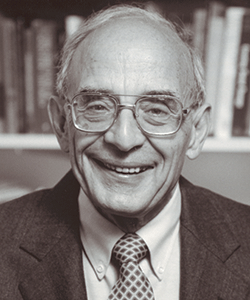Chris Argyris
 Harvard University
Harvard University
James McKeen Cattell Fellow Award
Chris Argyris is one of the world’s most respected management thinkers. A behavioral scientist, he has devoted his career to understanding how organizations operate and how managers learn.
Argyris’s early research focused on the impact of formal organizational structures, control systems, and management on individuals — and how those individuals respond and adapt to them. He was an early adopter of the ground-breaking T-group experiments in the 1960s. T-group training involves increasing trainees’ skills in working with other people, and Argyris found that T-groups successfully melted the rigid, authoritarian behavior of many managers. But to his chagrin, most T-group trainees reverted to their former behaviors once back in the workplace.
He has also focused his research on organizational change, in particular the behavior of senior executives, and on individual and organization learning.
Argyris is best known for his theory, in collaboration with the late philosophy scholar Donald Schön, on the two types of learning — single-loop and double-loop. This theory refers to the way people respond to changes in their environment. Single-loop learning is the repeated attempt at the same problem by an organization or individual, without varying the method or questioning the goal. Double-loop learning goes beyond that, modifying the goal in light of the experience.
Argyris’s work raises profound questions about how organizations run, and casts doubt on what is widely accepted as good practice. But he offers management a profound exploration of the fundamental principles of organizational behavior and human interaction in the workplace.





Comments
Sadly, Chris passed a way on Saturday, November 16. It is hard for me to explain how much of an impact he had on me as one of his graduate students and later when I helped manage my own consulting firm and in my professional practice. He was tough-minded, acute yet open and fair. More than most, he really walked the talk. His work, I believe, will continue to be critical to any efforts to improve the effectiveness of collective endeavors.
APS regularly opens certain online articles for discussion on our website. Effective February 2021, you must be a logged-in APS member to post comments. By posting a comment, you agree to our Community Guidelines and the display of your profile information, including your name and affiliation. Any opinions, findings, conclusions, or recommendations present in article comments are those of the writers and do not necessarily reflect the views of APS or the article’s author. For more information, please see our Community Guidelines.
Please login with your APS account to comment.